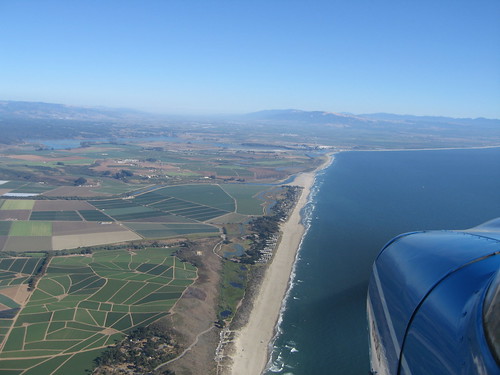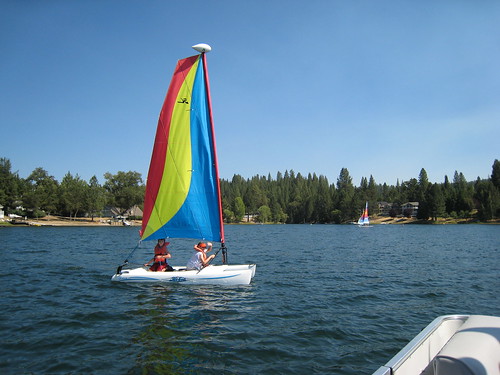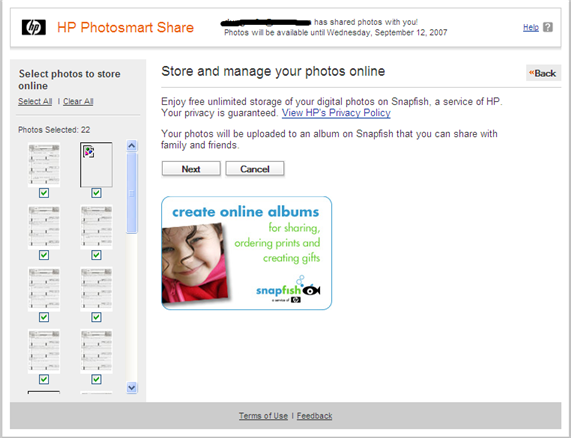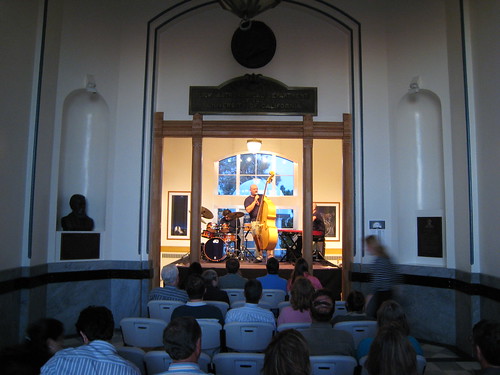August 30, 2007
Yahoo! Hiring a Technical Evangelist for Widgets (Konfabulator) and Devices
Are you interested in Yahoo! Widgets (formerly Konfabulator) and seeing more of Yahoo's web content, services, and tools move onto devices that might live in your pocket, living room, car, or kitchen?
![]() If so, send me a resume. The Yahoo! Developer Network (where I work) and Yahoo's "Connected Life" group is looking for a Technical Evangelist to help spread the word about what they're doing and play an important role in future strategy.
If so, send me a resume. The Yahoo! Developer Network (where I work) and Yahoo's "Connected Life" group is looking for a Technical Evangelist to help spread the word about what they're doing and play an important role in future strategy.
Here's some of what you might do:
- Build and own the relationships with key developers, ISVs, and partners
- Provide regular input from 3rd party developers, ISVs, and partners to product teams inside Yahoo! to influence product planning including research and face-to-face meetings
- Manage public launch plans for services
- Work closely with PR to obtain high-profile speaking slots at key events around the globe, positive mentions in appropriate press outlets, etc.
- Write for the YDN blog, international Yahoo! business unites, and other key industry publications (e.g. OíReilly, ZDNet, News.com, etc.)
- Maintain the event and sponsorship calendar for your area of focus
- Promote interesting, valuable, or useful Application Gallery submissions
- ...and lots more
The job is on-site in Sunnyvale, California and will likely involve travel now and then to various places around the US and a bit internationally.
Please do get in touch if you're interested (or know someone who'd be good). I'll get your resume directly to the hiring manager and answer any questions you have about Yahoo.
August 29, 2007
Web Platforms Discussion at Office 2.0 Conference in San Francisco
It looks like I'm going to be on the New Platforms panel at the Office 2.0 Conference next Friday in San Francisco.
If you haven't heard about the conference, the site says:
The Office 2.0 Conference is a collective experiment organized every year in San Francisco, CA and aimed at discovering the future of online productivity & collaboration. It is a unique gathering of visionaries, thought leaders, and customers using innovative online services for getting things done at the office, at home, and on the go. Please register before August 31st in order to benefit from the online rate. All attendees get an iPhone or a PlayStation 3.
Yes, I now have an iPhone but haven't removed the wrapping yet. Too much to do before I play with yet another distracting and shiny toy!
Anyway, about our panel topic...
The Web is the platform, but simple things like copy-and-paste, single sign-on, or integrated billing are nowhere near in sight. In order to address these requirements, new platforms such as Salesforce.com AppExchange, WebEx Connect, and OpenSAM are emerging. This session will provide an attempt at defining the concept for a Web platform, and outline the opportunities that exist for participants in these new ecosystems.
I still contend that There is no Web Operating System (or WebOS), so this discussion should be interesting. Either we're all going to agree about a lot of things, or I'll be there to argue with everyone. :-)
I expect to learn a lot from it. Drop by and say "hi" If you're in the neighborhood.
August 27, 2007
I Still Feel the Weekend in my Bones
Earlier today I was in a meeting that... well, let's just say it had a bit of difficulty getting on track in the beginning. We managed to tell a few jokes and talk about various off-topic things before finally getting down to business.

Before that happened, one person said something that summed up the mood quite well, I thought:
I sill feel the weekend in my bones...
Indeed.
I think we all had a bit more of the weekend in our bones this morning. It could have something to do with the fact that Summer will be over before too long. Or it could simply be that many of us had enjoyable weekends. In either case, I couldn't think of a better way to describe the cause of our restlessness.
August 23, 2007
Citabria, Champ, and Decathlon Flickr Photo Group
The other day I realized that there wasn't a Flickr Group dedicated to some of my favorite airplanes. So I created Citabria, Champ, and Decathlon on Flickr (a Yahoo service) as a group dedicated to pictures of the Aeronca, Bellanca, and American Champion tailwheel airplanes.
Of course, I'm a little biased since I own half of a 1969 Citabria 7KCAB (serial #181).
Anyway, if you're an owner, fan, or photographer of these birds, feel free to join the group and invite others :-)
August 22, 2007
Using del.icio.us as a writing summarization tool
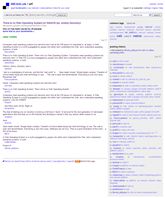 The other day after I wrote There is no Web Operating System (or WebOS), I noticed that a few people had bookmarked it in del.icio.us. This is nothing new. From time to time I see people using del.icio.us to save a reference to something I write, maybe jotting down a note or saving a brief excerpt along the way.
The other day after I wrote There is no Web Operating System (or WebOS), I noticed that a few people had bookmarked it in del.icio.us. This is nothing new. From time to time I see people using del.icio.us to save a reference to something I write, maybe jotting down a note or saving a brief excerpt along the way.
But I checked back a day later to find that a number of people had saved it (31 at the moment) and some of them did make a note of some sort along with it. Reading through those notes, I realized that they really fall into a few groups:
- A single quote from the article that the reader seems to think represents the spirit of what was said. For example, several folks quoted me saying "Computers need operating systems but networks don't."
- A statement of agreement or support, such as "Peach it!" or "Right on."
- A combination of those two
- A restatement of the premise of the article in the reader's own words.
Interestingly, the majority of folks so far who've made any notes about the article did so via #1 above. A smaller number did #2 or #3. So far nobody has done #4, but I have seen that reaction to some of my previous articles.
It occurs to me that with a sufficient number of people bookmarking an article and selecting a short passage from it, I have a useful way to figure out what statement(s) most resonated with those readers (and possibly a much larger audience). It's almost like a human powered version of Microsoft Word's document summarization feature.
That's a pretty cool del.icio.us byproduct that I hadn't really considered before.
August 21, 2007
Relative Efficency of Programming Languages vs. Legal Language
Dave Hitz, co-founder of NetApp, has an amusing blog post up that looks at "lawyer speak" from an efficency point of view. In Think of a Will as a Program You Can Only Test By Dying he considers the number of characters required to get a simple goal accomplished in both C and Legal Language (a will in this case):
The smallest "useful" computer program simply prints "Hello World!". It does almost nothing, so most of the program is overhead. In C, it takes 53 characters of program to print 12 bytes of text Ė an overhead factor of 4.4.
Iíve been reading LEGAL this week, because some friends of mine are writing their will. I agreed to be the trustee in case both parents die while the kids are still young. It occurred to me that the "hello world" of wills is this:
Leave everything to my spouse. If s/he is dead, then split it evenly among my kids.
This is pretty much what my friends' will said, but to express these 83 bytes of idea took 18,700 bytes of LEGAL, for an overhead factor of 225. That is, LEGAL is 51 times less efficient than C.
Heh.
He goes on to answer the question "Why is LEGAL such a shitty language?" and finds that, among other problems, "it doesnít use modern techniques like subroutines or standard libraries." Doing so would save a ton of time and effort. It'd probably also reduce the lawyer's income.
As he concludes:
Of course, there is one additional reason that legal documents are so long: Many lawyers are paid by the hour.
Indeed.
I'm not quite sure why this amused me as much as it did. Perhaps it's my programming background combined with the fact that I've been reading more legal documents recently. Either way, I can definitely see his points. The legal profession could learn a thing or two from good programming practices.
If you've ever heard stories about companies that experiment with paying their programmers based on the number of lines of code written (or number of bugs fixed per week), you'd understand how crazy this really could be.
August 20, 2007
There is no Web Operating System (or WebOS)
There. I said it.
For a while now I've been getting quite frustrated and annoyed by the writing I've read in various places about the idea of a WebOS (or this view), Cloud OS (if you're Microsoft), Google OS, Yahoo OS (yuck--too many "o"s), and so on.
There is no Web Operating System. There will be no Web Operating System.
Computers need operating systems but networks don't (not at the OSI layers I'm interested in, at least). A Web Operating System is a myth propagated by people who either don't understand the Web, don't understand operating systems, or both. A good example is this TechCrunch story where mimicking a desktop interface is confused with an operating system.
Anyone who thinks so is on crack and I just didn't know how to explain it until recently. But, as usual, the moment of clarity came when I was talking to someone else and not paying attention to what I was saying until the words were already out of my mouth--a problem that has landed me in hot water more than a few times.
Luckily, two of my coworkers caught on to what I was saying and managed to help put it into context a bit. First off was Matt McAlister (who runs YDN, the group I work in). In The Business of Network Effects he does a good job of explaining how businesses and services in a network are fundamentally different from those which are isolated islands.
Recalling a brief conversation we had a couple weeks ago, he says:
Jeremy Zawodny shed light on this concept for me using building construction analogies.
He noted that my building contractor doesnít exclusively buy Makita or DeWalt or Ryobi tools, though some tools make more sense in bundles. He buys the tool that is best for the job and what he needs.
My contractor doesnít employ plumbers, roofers and electricians himself. Rather he maintains a network of favorite providers who will serve different needs on different jobs.
He provides value to me as an experienced distribution and aggregation point, but I am not exclusively tied to using him for everything I want to do with my house, either.
Similarly, the Internet market is a network of services. The trick to understanding what the business model looks like is figuring out how to open and connect services in ways that add value to the business.
Bingo.
The web is a marketplace of services, just like the "real world" is. Everyone is free to choose from all the available services when building or doing whatever it is they do. The web just happens to be a far more efficient marketplace than the real world for many things. And it happens to run on computers that each need an operating system.
But nobody ever talks about a "Wall Street Operating System" or a "Small Business Operating System" do they? Why not?
Ian Kennedy followed up to Matt's post with The Web as a Loose Federation of Contractors in which he says:
I like Jeremyís illustration - an OS gives you the impression of an integrated stack which leads to strategies which favor things like user lock-in to guarantee performance and consistency of experience. If you think of the web as a loose collections of services that work together on discreet projects, then you start to think of value in other ways such as making your meta-data as portable and accessible as possible so it can be accessed over and over again in many different contexts.
Bingo again.
Lock-in is what vendors like Microsoft and IBM had relied on for years and years. Today's on-line lock-in is focused mainly on things that are less concrete: your social graph or the list of television shows you like to watch, for example.
But when you stop and look at how technology has changed and opened in response to networks, the Internet, simple/open protocols, view source, and self-serve business systems, there's a clear pattern emerging. Strong forces are at work here--strong enough that you're better taking advantage of them rather than fighting them. You will lose. I don't care if you're Microsoft, Google, or even Facebook (the latest golden child).
Open beats closed. Simple beats complex. Freedom of choice beats being told what technology to use.
The idea of starting now (or recently) to build up a full blown "stack" of services for the next generation of web-based applications (the kind that run on the Internet) and deciding to market it that way seems rather insane to me. You're using strategies and tactics from the previous war. It's last year's thinking (where "last year" is about 2001).
That may work in corporate IT shops (which are known for their brain-dead approach to software projects), but on the big bad Internet, it's a very different story.
The web is open and decentralized. Everything is one click away. Remember that.
Mashups are not toys. They're a good illustration of this point... a hint of the future.
A Lunch Flight to Half Moon Bay
On Sunday we decided that it was time to get back in the air again. After putting a new tailwheel spring chain on the airplane (the right one this time--last time it was the left), we headed out toward the south, aiming for Watsonville and ultimately the Pacific coast. The plan was to fly up the coast roughly 60 miles to Half Moon Bay Airport.
Before too long were we on the ground.
After arriving and tying the plane down at the far south end of the field, we walked through the path to the gate that leads to some of the nearby shops and restaurant. The nearest establishment to the airport is Mezzaluna, a nice little Italian place. They make a fantastic meat sauce.
We spent a bit of time walking by the ocean and checking out a few of the local shops before heading back to the airport for the flight back home. With full bellies, we decided to take out time and do a bit more sightseeing and photography along the way.
Along the way we got some excellent shots of the coast, including a lighthouse.
And the part I had most fun with was along the coast near Watsonville. We dropped down a few thousand feet, slowed the plane down, and put the camera out the window.
On the way home we swung by Frazier Lake Airport to play on their wonderful grass airstrip a bit.
Not a bad way to spend a Sunday afternoon! :-)
Full pictures are available here: Half Moon Bay Lunch Flight on Flickr.
August 16, 2007
Best Use of a Tag Cloud. Ever.
One of the financial blogs I regularly read is Paul Kedrosky's Infectious Greed. He's got a great style, is funny, and frequently points at excellent resources and further reading.
Today I nearly fell off my chair laughing when I came across his use of a tag map to analyze hedge fund apology letters.
You see, he started by reading the letters...
The WSJ has done a nice job of collecting all the supposed apology letters to investors from various quant hedge fund managers concerning their recent crummy performance. Trouble is, a) it's way too much reading, and b) there aren't really any apologies to be found.
Which led to him using MS Word to summarize them. And then he applied a tag cloud.
And now, the top 40 words from the non-apology letters (with, once again, "apologize" and "sorry" again not being among them) in a tag cloud, with bigger and bolder corresponding to usage frequency:

I wish I knew why, but that really tickles my funny bone. Really.
Maybe it's the non-web 2.0 but still geeky way in which he's applying it. Maybe it's because "tag cloud" and "hedge fund" are so far apart in my brain. Or maybe it's just plain amusing.
Either way, well done, Paul. :-)
A Day at Pine Mountain Lake
Last weekend we had to chance to spend most of Saturday at Pine Mountain Lake, a private resort community in the foothills of the Western Sierra Nevada mountains (roughly 3,000 foot elevation). It's only a half our drive from the entrance to Yosemite National Park.
Pine Mountain has a about 3,000 homes in and around the lake area, several beaches, a golf course, campgrounds, an equestrian center & stables (horse rides), an airport (and aviation association), tennis courts, pool, and so on.
Many of the homes are vacation or second homes, weekend getaways, or rentals, though there is a sizable contingent of full-time residents as well (some retired, some airplane commuters). The most desirable properties seem to be on the lake, up high with views, or near the airport (with taxiway access!).
The lake has abundant activities for a relaxing weekend. One can swim, play volleyball, rent a kayak or sailboat, or take a ride on the water taxi. For $2/day (children are $1/day), you can ride the boat between the four stops around the lake, including the main Pine Mountain Lake Marina, Lake Lodge Dock, Fisherman's Cove, and Dunn Court Beach.
We took the 45 minute water taxi ride around the lake to get a good sense of what's where. It's worth noting that there's a 5mph speed limit on the lake most of the time, except during water ski hours.
There's food and drinks available within feet of the beach and lots of grass on which to put your towel, umbrella, chairs, tent, whatever. There are public use charcoal grills as well.
All in all, it's not a bad place to spend a day. Or weekend. Or a week. Or even more... :-)
Pictures: Pine Mountain Lake, August 2007 (on Flickr)
August 13, 2007
Is SnapFish Completely Useless?
Or is it just me?
First I had Spock trying to borrow my passwords and now SnapFish won't let me see the pictures that someone is trying to show me. And their UI and language are completely puzzling.
Let me show you...
First I get an email on behalf of someone who scanned in a few documents I need to look at. It came from "HP Photosmart Share" and has a "View Larger Photos" link that bounced me over to photosmart.hpphoto.com (since putting the actual photos in the email would be too much like rocket surgery, I guess).
Fine. That page looks like this:
First off, the broken image in the series of thumbnails is not inspiring. But I put that aside and read the text. Apparently HP has my photos but won't let me see them until they're uploaded to SnapFish. WTF?!
Why weren't the uploaded and ready for my arrival?
Okay, so I have to click the "Next" button to start that process. I do that and am asked to sign in to SnapFish.
Grr. I then go through the password recovery process (since I've only used it once ages ago) and continue on a few minutes later.
A pop-up (again, WTF?!) appears that looks like this:
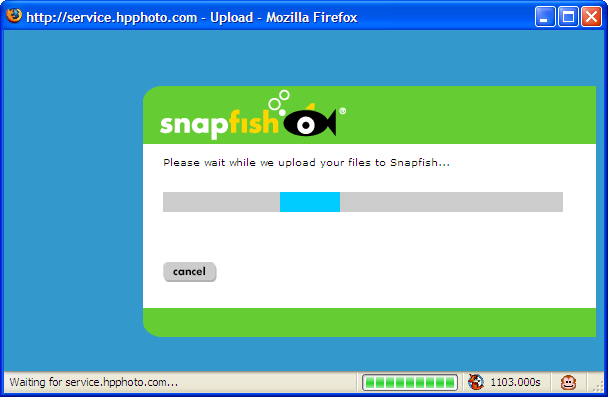
Except that it's "animted" a bit but you can't see that in a single screenshot. Notice the Fasterfox timer in the bottom right of the window?
Yeah, I've been waiting over 18 minutes to get my damned pictures!
Actually, it's up to 35 minutes now. I let it keep running while I'm typing this. And, of course, this isn't my first attempt. It's my third. I've tried this twice already earlier today.
How the heck am I supposed to get my pictures? Why doesn't this "smart" software just put them in the email so I can see them when I get the message? Attaching JPEG files to an email message is hardly advanced technology, folks!
I'm starting to get the feeling that HP wasted some serious money by buying SnapFish.
Ugh.
Some days I just want technology (and the marketing people who make decisions like that) to get the heck out of the way so I can get the things done that I need to get done.
Photo"smart"? Hardly.
AdSense CPMs by Referral Source for a Day
It's been about a year and a half since I wrote Following the Search Engine Referral Money Trail, which looked at my traffic sources from an AdSense earnings point of view.
Realizing that I hadn't been keeping good tabs on it, I decided to use last night's closing numbers (well, from 15 minutes until midnight) to get a one day snapshot of the eCPM values for my AdSense referral tracking channels. Here's a screenshot with the irrelevant columns removed.
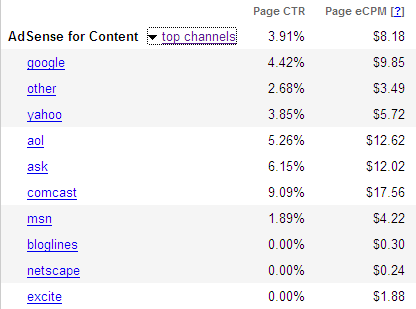
Interesting, no?
I really need to figure out how to attract more Ask.com, Comcast Search, and AOL users! Apparently the MSN Search users that used to monetize really well a couple years ago have migrated to another search engine. Good for them!
Just kidding. :-)
There's clearly a lot going on behind these numbers and it is only one day's worth of traffic. From what I've seen in the past, the fact that this is data from a weekend (and a Sunday) is quite significant. It might look different on a Wednesday, for example.
What hasn't changes since last time is the large variation among all the sources.
Anyway, I just thought I'd see if anyone else is doing similar analysis on their own personal sites.
August 12, 2007
Spock sign-up flow demonstrates how to scare users away...
I got an invitation to yet another online service that I hadn't heard of today: Spock. Their about page says:
Spock is the online leader in personal search, helping users find and discover people. With over one hundred million people already indexed and millions added every day, Spock is building the broadest and deepest people specific search engine.
Putting aside the amusing claim of a beta service that most people have never heard of being "the online leader", their sign-up flow is kind of spooky. I just attempted to go through it and gave up at step #2.
In step #1 I was asked to enter my first and last name, gender, and click a couple of checkboxes (yes, I'm over 13 and, yes, I've read your terms of service (actually I haven't... who ever does?)). Easy enough.
Then came step #2 which looks exactly like this:
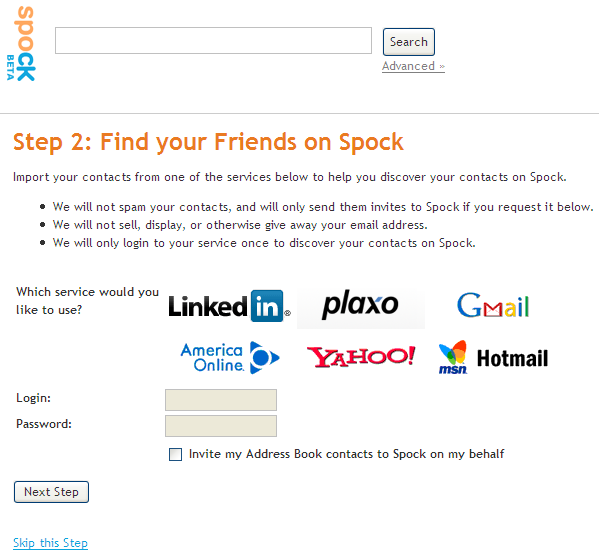
That's right. They want me to provide my username and password for the on-line services that may contain some of my most sensitive information, including: Gmail, Plaxo, Yahoo, Hotmail, and AOL.
I can't think of a very polite way to say "no fucking way", so I won't even try. There wasn't a button for that.
You see, while they make several promises on that page, there's no way to verify them and no notion of what my recourse would be if they're broken. That's a pretty high price to pay to test out a service that I may never need.
I guess I should see this as a request for address book access in the Yahoo! Mail API. But all those services would probably need address book and/or contacts APIs before Spock would stop trying to convince users to give away their passwords (likely in violation of the TOS for each one).
August 09, 2007
Millionaires, Greed, and Insecurity in Silicon Valley
The recent New York Times article titled In Silicon Valley, Millionaires Who Donít Feel Rich evoked a lot of interesting responses on-line. Unfortunately, I didn't have the time to comment when I first read it, but it's been sitting in the back of my mind ever since then.
 In one way this article really confirms some of the things that bug me about Silicon Valley. There's an awful amount (or an unhealthy amount, if you prefer) of both greed and financial insecurity around here. You don't have to live here very long before you start to notice it. And before too long, you might find yourself being pulled in yourself. I know that it happened to me on a few occasions.
In one way this article really confirms some of the things that bug me about Silicon Valley. There's an awful amount (or an unhealthy amount, if you prefer) of both greed and financial insecurity around here. You don't have to live here very long before you start to notice it. And before too long, you might find yourself being pulled in yourself. I know that it happened to me on a few occasions.
I've had to actively work to make sure I don't fall into those traps. It can be really hard when you're surrounded (sometimes quite literally) by people who have millions of dollars at their disposal. And the funny thing is that the insecurity is almost always completely unjustified. The types of talented people who are drawn here really don't have a lot of trouble finding a job that'll pay the bills--and then some.
I take some solace in the fact that a fair number of the millionaires I know seem to be no happier than I am with all that money. Worse yet, they continue to work for reasons that mystify me. Many don't seem particularly happy with their jobs. And that's the saddest part of all in my mind.
Sometimes I think it's a lack of creativity or ambition. But I honestly don't know.
You see, I've given this some thought over the years. If, like some of the folks in the article, I had $5 million dollars sitting around, you sure as hell wouldn't catch me sitting in a cubicle. A wisely invested $3 - $5 million can provide more than enough to live on quite comfortably (assuming you've eliminated debt) while still growing the investment too.
There's a really big world out there and a lot of interesting things to do, people to meet, ideas to try out, and relaxing to be had. We all know that life is short. I'd take that to heart and act like time was a scarce resource--because it is!
I'd get outside more often. I'd fly. I might teach others to fly. I'd read more books. Get a telescope. Go for long walks and/or hikes in amazing places. I'd travel a bit more. I'd move a bit out of the Bay Area, where the focus on the next shiny thing and making millions of dollars simply doesn't exist.
Basically, I'd relax and really enjoy life. I wouldn't stress out over making another few million dollars or trying to be the next Big Thing.
Sure, I know that there are some people who can only ever be happy when they're working 12 hours a day to build the next big thing. I guess what I'm saying is that I'm definitely not one of them. My life's todo list has far more things on it that I'd like to get around to.
Now... anyone got a few million dollars that I can hold on to for the next 40 years? :-)
August 07, 2007
YSlow Screencast and Lessons Learned
This is sort of a duplicate of my YSlow Podcast Interview and Screencast Demo post on the YDN blog, but there were a few more things I wanted to say.
First off, in case you missed it, Dan Theurer and I sat down with Steve Souders (Chief Performance Yahoo) to talk about YSlow and web site performance issues. We made an audio podcast and a video demo (QuickTime or on-line via JumpCut) that's a follow-on demo to what we discussed in the audio-only presentation.
This was fun for me, not just because I got to learn about YSlow and understand how it works, but it's also the first "real" screencast that I got to produce myself. In the past Matt McAlister did a lot of that work, but this was my chance to get my hands dirty with Camtasia. There's a bit of a learning curve to using Camtasia, but once you get into the groove, it's pretty good. Not that I don't have a lot more to learn and improve upon, of course. :-)
However, I have newfound admiration for folks like Jon Udell who've been producing very effective screencasts for a long time now, often using older and less capable tools than what I have now.
I've realized that I need to do a bit more prep work before sitting down to record. Specifically, we need a better thought out agenda--almost a timeline of how we'd like things to flow. This makes it harder to produce too much material, but it would also help to ensure that we don't miss out on important information along the way.
In the post-processing world, there's a ton of stuff you can get wrong. There are far too many video output formats, codecs, and settings to choose from. I must have "produced" the video over two dozen times before settling on a combination that actually seems to work for most platforms. It was surprising how many times I'd get a good video and no sound. Or complaints from a Mac user about needing to install extra software just to view it. And don't even get me started on the stupid size restrictions on video uploads that I ran into.
All in all it feels like the technology for making these videos, uploading, and publicizing them has a long way to go. It's good enough now for people like me (willing to really screw around with it) but need a few more years to bake for the less devoted.
August 06, 2007
Kurt Ribak Trio Concert at Lick Observatory on Mt. Hamilton
Last Friday (August 3rd), Kathleen and I attended the Music of the Spheres benefit concert series at the Lick Observatory atop Mt. Hamilton.
We had VIP tickets (purchased months in advance), which entitled us to a 1.5 hour tour of some of the facilities, a simple dinner with wine, prime seating at the concert, viewing through the 36-inch refracting telescope, a commemorative wine glass (or mug), and so on.
After the tour was open, we were treated to a bit over an hour of music by the Kurt Ribak Trio. Sitting close to the stage, I was worried about it being too loud, but they had the sound levels just right. And their performance was quite good.
The evening ended with an astronomy lecture and viewing through the old 36 inch telescope.
Finally, we had the opportunity for outdoor viewing with about half a dozen local amateur astronomers and their multi-thousand dollar telescopes. I want one. (I was an Astronomy minor in college, so I've wanted one for a long time...) We got to see Jupiter and three of its innermost moons, a nebula, and a globular cluster.
All in all it was an excellent way to spend a Friday night.
More photos are available in this set: Mt. Hamilton Lick Observatory Concert
August 02, 2007
Delete, Delegate, Respond, Defer, or Do: The Inbox Zero Approach to Email.
Merlin Mann's "inbox zero" video is an excellent watch for anyone who has struggled with an overflowing email inbox and tried various things to cope with it. He has a GTD-inspired approach that likely works very well once you get yourself into a habit of following it religiously.
While I highly recommend watching the entire hour long video to get the excellent Q&A and more of his philosophy, the basic approach is simple: always empty your inbox. Figure out which actions you can apply to email and just do it.
His list is quite simple:
- Delete: just get rid of it (or archive it)
- Delegate: get someone else to deal with it
- Respond: if it takes just a few minutes, do it right now
- Defer: put it on a todo list, archive it, and deal with it later
- Do: handle whatever the email actually needs you to do
Of course, the key piece if the discipline. No system in the world works well without it. But having a framework is an excellent start. And Merlin is an excellent presenter.





